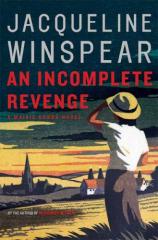Reading Group Guide
Discussion Questions
An Incomplete Revenge: A Maisie Dobbs Novel

1. Divided between past and present, between her female gender and her male-dominated profession, and between her British identity and part-gypsy ancestry, Maisie Dobbs is a character of intense inward divisions. How do these divisions both complicate and strengthen Maisie as a character?
2. A variety of pivotal scenes in An Incomplete Revenge involve dramatic uses of fire. What range of moods, feelings, or symbolic meanings does fire represent in the novel?
3. Although several of the residents of Heronsdene are developed individually as characters, the townspeople are also dominated by an ominous group psychology. What might Winspear be suggesting through her portrayal of this town about the limits of people’s abilities to think or choose for themselves?
4. Maisie is freer from class prejudice than most of the other characters in Winspear’s novel. Nevertheless, does an awareness of class difference influence her relationships with people like Billy Beale and Priscilla Evernden? How?
5. Animals, especially dogs and horses, appear prominently in An Incomplete Revenge. How do their presence and the way they are treated help us to better understand Winspear’s human characters?
6. Followers of the Maisie Dobbs series have shared the heroine’s dread anticipation of the death of her long-incapacitated friend Simon Lynch. Does his death in An Incomplete Revenge affect Maisie (or you) in the ways that you anticipated? What choices does Winspear make in describing Maisie’s emotional response, and do you agree with them?
7. A character from a previous Maisie Dobbs mystery observed that war is despicable because it is “not over when it ends.” How might this seeming paradox be applied to An Incomplete Revenge? Through the death of Simon Lynch and the group confession that marks a climax in the novel, do you think Maisie and the townspeople of Heronsdene are moving toward a long-awaited closure, or do you think they will continue to be trapped and haunted by the memories of the Great War? On what do you base your judgment?
8. What is Maisie’s attitude toward the gypsy elements in her ancestry? In a novel that counsels the acceptance and understanding of different ethnicities, is Maisie sufficiently accepting of her own mixed heritage?
9. At the end of the novel, Maisie dances alone in her apartment. Discuss the significance of this gesture.








